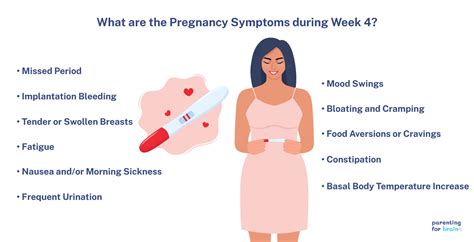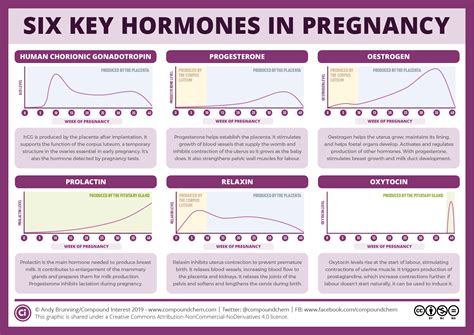Intro
Discover early signs of 4 weeks pregnant symptoms, including morning sickness, fatigue, and breast tenderness, as your body undergoes implantation, hormonal changes, and embryo development during this crucial week of pregnancy.
At 4 weeks pregnant, many women are still unaware that they are expecting a baby. However, some may start to experience early symptoms of pregnancy. These symptoms can be mild and may be mistaken for other conditions, such as premenstrual syndrome (PMS) or a stomach bug. As the embryo implants in the uterus, hormonal changes occur, leading to various physical and emotional sensations.
During this period, the fertilized egg has traveled down the fallopian tube and into the uterus, where it implants itself into the uterine lining. This process triggers a range of hormonal changes, including an increase in human chorionic gonadotropin (hCG) and estrogen levels. These hormonal fluctuations can cause a variety of symptoms, including mood swings, breast tenderness, and fatigue. Some women may also experience mild cramping, spotting, or light bleeding as the embryo implants.
As the body adjusts to the new pregnancy, women may notice changes in their appetite, digestion, and sleep patterns. Food cravings or aversions may develop, and some women may experience morning sickness, although this is more common in the coming weeks. It's essential to remember that every pregnancy is unique, and not all women will experience the same symptoms at the same time. Some may feel perfectly fine, while others may be more sensitive to the hormonal changes.
Early Symptoms of Pregnancy

At 4 weeks pregnant, some common symptoms include:
- Mild cramping or spotting as the embryo implants
- Breast tenderness or swelling
- Fatigue or exhaustion
- Mood swings or emotional changes
- Food cravings or aversions
- Mild morning sickness or nausea
- Increased urination due to hormonal changes
- Constipation or digestive changes
Physical Changes
As the body adapts to the pregnancy, women may notice physical changes, such as: * Breast tenderness or darkening of the nipples * Mild weight gain or bloating * Increased blood flow, leading to a warmer sensation in the hands and feet * Changes in skin texture or acnePregnancy Hormones

The hormonal changes during pregnancy are triggered by the increase in hCG and estrogen levels. These hormones play a crucial role in maintaining the pregnancy and supporting the growth of the embryo. hCG helps to:
- Stimulate the corpus luteum to produce progesterone
- Maintain the uterine lining and support implantation
- Regulate the immune system to prevent rejection of the embryo
Estrogen, on the other hand, helps to:
- Stimulate the growth of the uterus and breasts
- Regulate the menstrual cycle and ovulation
- Support the development of the placenta and fetal membranes
Emotional Changes
The hormonal fluctuations during pregnancy can also lead to emotional changes, such as: * Mood swings or irritability * Anxiety or stress * Excitement or euphoria * Increased emotional sensitivityConfirming Pregnancy

At 4 weeks pregnant, women can confirm their pregnancy using:
- Home pregnancy tests (HPTs)
- Blood tests to detect hCG levels
- Ultrasound scans to visualize the embryo
It's essential to note that HPTs may not always be accurate, especially if taken too early. Blood tests and ultrasound scans can provide more accurate results.
What to Expect
In the coming weeks, women can expect: * Morning sickness to intensify * Fatigue to increase * Breast tenderness to persist * Mood swings to continue * Food cravings or aversions to developPrenatal Care

Prenatal care is essential to ensure a healthy pregnancy and baby. Women should:
- Schedule regular check-ups with their healthcare provider
- Take prenatal vitamins to support fetal development
- Maintain a balanced diet and healthy lifestyle
- Avoid smoking, alcohol, and recreational drugs
Healthy Habits
To support a healthy pregnancy, women can: * Eat a balanced diet rich in fruits, vegetables, and whole grains * Stay hydrated by drinking plenty of water * Exercise regularly, such as walking or prenatal yoga * Get enough sleep and restCommon Concerns

At 4 weeks pregnant, women may have concerns about:
- Miscarriage or ectopic pregnancy
- Morning sickness and nausea
- Fatigue and exhaustion
- Breast tenderness and nipple soreness
Addressing Concerns
Women can address these concerns by: * Consulting their healthcare provider for guidance and reassurance * Practicing self-care and stress management techniques * Staying informed about pregnancy and fetal development * Connecting with other expectant mothers or support groupsPregnancy Tips

To navigate the early stages of pregnancy, women can:
- Keep a pregnancy journal to track symptoms and progress
- Stay organized with a pregnancy planner or app
- Connect with their partner and loved ones for support
- Prioritize self-care and relaxation techniques
Support Systems
Having a strong support system can make a significant difference during pregnancy. Women can: * Share their news with family and friends * Join online communities or forums for expectant mothers * Attend prenatal classes or workshops * Connect with their healthcare provider for guidance and carePregnancy Resources

Women can access a range of pregnancy resources, including:
- Online pregnancy websites and forums
- Prenatal books and guides
- Mobile apps for tracking pregnancy and fetal development
- Local support groups and communities
Final Thoughts
At 4 weeks pregnant, women are embarking on an incredible journey. By staying informed, prioritizing self-care, and seeking support, they can navigate the early stages of pregnancy with confidence and excitement. As the body adapts to the new pregnancy, women can expect a range of physical and emotional changes. By embracing these changes and seeking guidance from healthcare providers, women can ensure a healthy and happy pregnancy.What are the most common symptoms of pregnancy at 4 weeks?
+The most common symptoms of pregnancy at 4 weeks include mild cramping, breast tenderness, fatigue, mood swings, and food cravings or aversions.
How can I confirm my pregnancy at 4 weeks?
+You can confirm your pregnancy at 4 weeks using home pregnancy tests, blood tests to detect hCG levels, or ultrasound scans to visualize the embryo.
What are some healthy habits I can practice during pregnancy?
+Healthy habits during pregnancy include eating a balanced diet, staying hydrated, exercising regularly, getting enough sleep, and avoiding smoking, alcohol, and recreational drugs.
We hope this article has provided you with valuable insights and information about 4 weeks pregnant symptoms. If you have any further questions or concerns, please don't hesitate to comment below or share this article with your friends and family. Remember to prioritize your health and well-being during this incredible journey, and don't hesitate to seek guidance from your healthcare provider whenever you need it.
